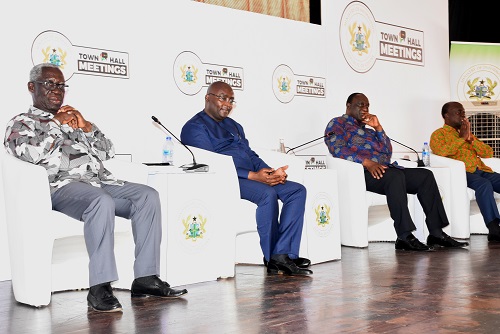
The government’s maiden town hall meeting addressed by the Vice President Dr Mahamudu Bawumia and other members of the Economic Management Team (EMT) on Wednesday has drawn diverse reactions from economists and associations.
Reacting to the meeting in an interview with the Ghanaian Times yesterday, Professor John Gatsi, an economist and Head of Finance Department at the University of Cape Coast said it was not out of place for the government to engage the people on developments in the economy but the discussion needed to be put in proper context.
For instance, he said the Vice President’s analysis did not take into consideration the rebasing of the economy which reduced the country’s debt to GDP ratio.
He also discounted Dr Bawumia’s assertion that the recent cedi depreciation, was not due to weak fundamentals but external factors, saying the same external factors should have been considered in his analysis while the ruling government was in opposition.
According to him, the policy being considered to check the black market was already in existence and that it was the responsibility of the Bank of Ghana to check their activities.
He welcomed the slashing of the benchmark value for imports but hoped that it would not be a repetition of the announcements in the 2017 budget when the decreases announced did not reflect reality.
He doubted if the reduction would take immediate effect as it would have to go through processes including parliamentary approval.
Professor Godfred Alufar Bokpin, Finance Department, University of Ghana, observed that the government could do more despite its enviable macroeconomic indicators compared to its processor.
He said preferred standard of measuring economic performance should be the Human Development Indicator, Social Progression Index and Happiness Index, among others.
“Gross Domestic Product (GDP) growth is not enough. Way back in the 1930s where the whole concept of GDP growth came into being a measure of economic growth, it came with its own weaknesses but we have lived with it up to this time and that is why other indicators have been developed.
“Let us look at where we could be, and compare ourselves to our proper peers with the middle-income regime, that will be very helpful,” he said.
He said, “Admittedly, we have made some progress in the last two years but we could have done better.”
He urged the government to exploit fully the potentials of the economy to the development of the people.
Citing shortfalls in revenue mobilisation as a case in point, he lamented how “revenue envelope has remained dwarfed from the previous government up until now. We have more than six million people in tax paying positions but just 1.5millin people pay tax in the country”, he said.
The lecturer opined further that “debt sustainability analysis made on Ghana suggests that the country had not made enough progress”.
Chief Executive Officer of the Association of Ghana Industries, Seth Twum Akwaboah said the benchmark duty reduction does not mean a reduction in duties.
He said that the benchmark values do not “add much” because they become inapplicable if importers are declaring the right values.
He admitted, however, that a total invoice value reduction in import rates would have grave effects on Ghanaian industries, suggesting that would have opened the flood gates for imports.
By Kingsley Asare & Jonathan Donkor







